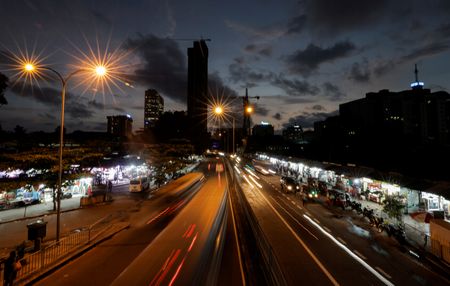(Refiles to fix formatting)
By Giulia Segreti and Sarah Young
LONDON (Reuters) -Britain, Italy and Japan will set up a joint company to develop, design and build an advanced stealth jet, they said on Friday, moving forward with a major defence project at a time of political turmoil and regional conflict across the world.
The deal comes as European nations are scrambling to build up their militaries following Russia’ invasion of Ukraine and calls from U.S. President-elect Donald Trump for higher defence spending, while Japan also wants to bolster its forces given what it sees as a growing threat from China.
The announcement is a major step forward from an initial agreement in 2022 to develop a common fighter jet, named Global Combat Air Programme (GCAP), and aims to bring to life a successor to the Eurofighter jet, scheduled to go out of service in 2040, and Japan’s F-2 fighter.
The new company, in which Britain’s BAE Systems, Italy’s Leonardo and Japan’s Aircraft Industrial Enhancement (JAIEC) will each hold a 33.3% share, will be headquartered in Britain, while its first CEO will be from Italy.
“Peace must be defended and defending peace has a cost, that’s why synergies among governments and companies are fundamental, nobody can make it on its own… and (the GCAP) is a terrific example,” Leonardo CEO Roberto Cingolani said at the deal signing.
The three countries said in November they were discussing opening up the project to other countries. Italy’s foreign minister said the programme would likely be extended to Saudi Arabia.
BAE managing director Herman Claesen said the new company, expected to be established by the middle of 2025, allows for new entrants.
“The door is open to other partners to join, and that includes Saudi Arabia, but ultimately it is the call of the three governments,” he told reporters.
EXPORTS
By working together on the project, which in Britain was formerly known as Tempest, the three countries will be able to share the tens of billions of dollars in costs and secure orders for the jet, while looking to international markets for sales to boost volumes.
Some analysts have said full Saudi participation could make it harder for nations to reach a consensus over export policy.
Claesen said it was too early to put a value on the project, but it would generate “hundreds of billions over multiple years” in development, manufacturing and other work.
Meanwhile France, Germany and Spain are working on their own next-generation fighter project, prompting some in the industry to question whether Europe could sustain two decades-long programmes.
The project envisions stealth fighters operating in tandem with drones, with the first aircraft expected to enter service in 2035, a timeline which some defence experts have said is ambitious.
“That is absolutely our target date for this programme and continues to be the target,” Claesen said, adding that the speed at which the company is being set up puts GCAP well ahead of Eurofighter.
Japan, in particular, with an increasingly assertive China on its doorstep, is keen for the project to stay on schedule.
The new company will subcontract the manufacturing and assembly of the aircraft to BAE, Japan’s Mitsubishi Heavy Industries and Leonardo, the statement said.
The share of work will be split evenly, Claesen said.
The announcement puts an end to speculation that Britain’s Labour government, elected in July, might downgrade or scrap GCAP after it launched a defence review in 2025.
“The fact that the three governments have moved forward … and for us to move forward with this joint venture, I think reflects that commitment that the UK government has been demonstrating over the last number of weeks,” Claesen said.
(Reporting by Giulia Segreti in Rome, Sarah Young and Paul Sandle in London and Tim Hepher in Paris, Editing by Louise Heavens)








